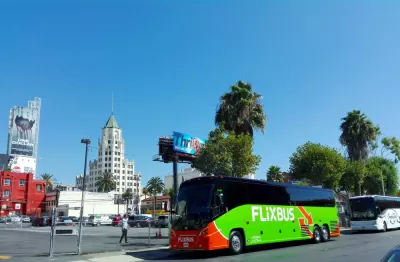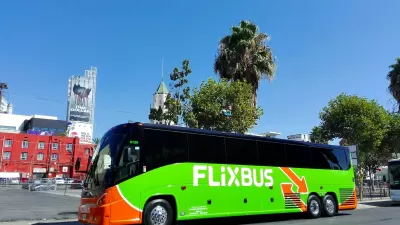Much less expensive than rail, intercity buses serve millions of Americans every year, but public subsidies are lacking.

In an op-ed published inSmart Cities Dive, Kai Boysan, the CEO of Flix North America, an intercity bus operator, argues that funding and supporting intercity bus travel is a cost-effective way to improve transportation in the United States.
With their cost efficiency; flexible, demand-responsive operations; and minimal reliance on ongoing subsidies, privately operated intercity buses offer one of the highest returns on investment for federal transportation funding.
If the Trump administration is looking for efficiency, Boysan argues, intercity buses are the answer to expensive rail projects. “We estimate that intercity bus subsidies deliver more passenger-miles per dollar spent than any other mode of surface transportation — making them one of the highest-return investments for taxpayers while providing an essential service to millions, including some of the nation’s most vulnerable populations.”
Boysan’s obvious vested interest aside, intercity buses do serve some of the lowest-income Americans and offer links between rural and remote places that have few other transit options. According to Boysan, “Intercity buses connect more than 6,000 stations across the U.S., more than 12 times as many locations as long-distance passenger rail and commercial airlines.”
Boysan offers more reasons why investing in intercity bus service is efficient, scalable, and flexible. Targeted federal investments in infrastructure improvements, such as intermodal transportation hubs, could go a long way toward making bus travel more accessible, safe, and comfortable. “In addition, the government should encourage more partnerships between private intercity bus companies and public transportation agencies such as those that facilitate intermodal transportation. These partnerships could lower terminal unit costs per passenger, enhance safety and security through shared personnel and infrastructure and facilitate smoother intermodal transfers, ultimately leading to expanded service and increased ridership.”
FULL STORY: Maximizing ROI in transportation: The case for intercity buses

Planetizen Federal Action Tracker
A weekly monitor of how Trump’s orders and actions are impacting planners and planning in America.

Maui's Vacation Rental Debate Turns Ugly
Verbal attacks, misinformation campaigns and fistfights plague a high-stakes debate to convert thousands of vacation rentals into long-term housing.

San Francisco Suspends Traffic Calming Amidst Record Deaths
Citing “a challenging fiscal landscape,” the city will cease the program on the heels of 42 traffic deaths, including 24 pedestrians.

Defunct Pittsburgh Power Plant to Become Residential Tower
A decommissioned steam heat plant will be redeveloped into almost 100 affordable housing units.

Trump Prompts Restructuring of Transportation Research Board in “Unprecedented Overreach”
The TRB has eliminated more than half of its committees including those focused on climate, equity, and cities.

Amtrak Rolls Out New Orleans to Alabama “Mardi Gras” Train
The new service will operate morning and evening departures between Mobile and New Orleans.
Urban Design for Planners 1: Software Tools
This six-course series explores essential urban design concepts using open source software and equips planners with the tools they need to participate fully in the urban design process.
Planning for Universal Design
Learn the tools for implementing Universal Design in planning regulations.
Heyer Gruel & Associates PA
JM Goldson LLC
Custer County Colorado
City of Camden Redevelopment Agency
City of Astoria
Transportation Research & Education Center (TREC) at Portland State University
Jefferson Parish Government
Camden Redevelopment Agency
City of Claremont





























